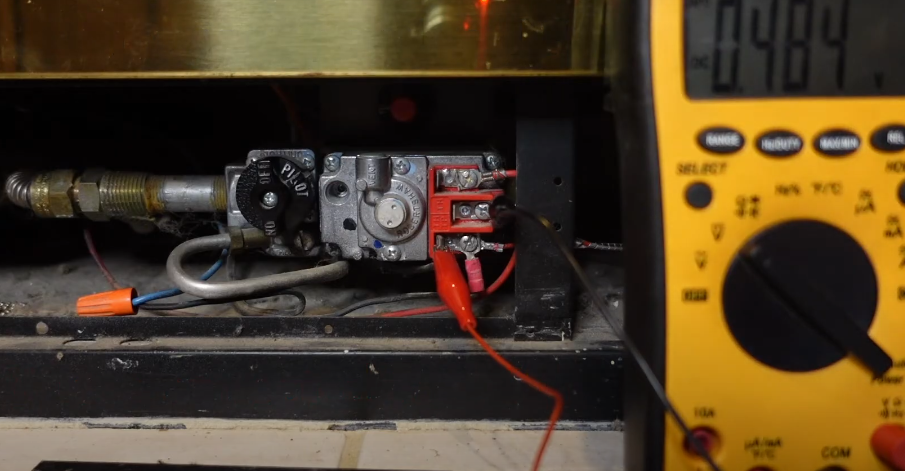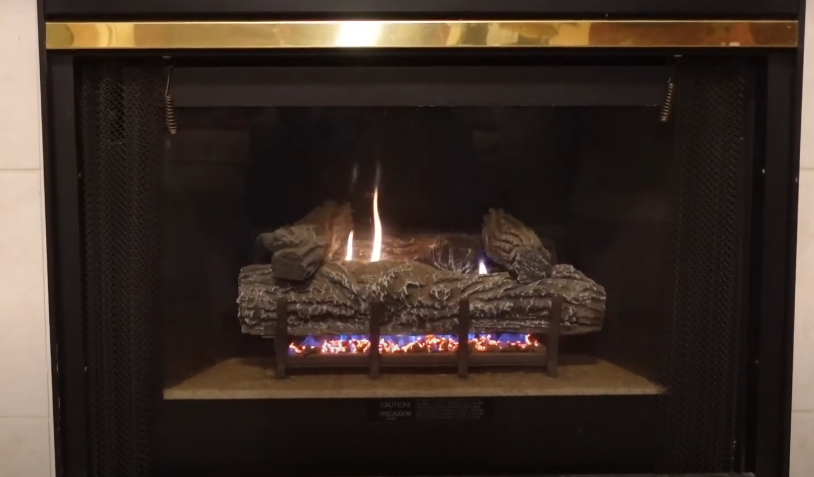Will a Gas Fireplace Shut Off If It Overheats? Safety Explained
Most modern gas fireplaces include an auto-shutoff feature that cuts gas if the unit overheats. That means if it gets too hot, a sensor like an overheat cutoff or oxygen depletion sensor (ODS) will shut it down. However, not all models have this, so you should know how to turn off gas to the fireplace manually if needed.
Some people ask if it’s OK to leave a gas fireplace on overnight or safe to leave on all night. In a vented model you can usually run it for hours (with a CO alarm), but a ventless unit hurts air quality and isn’t great for your health by raising CO₂ and NO₂. Keep the fireplace regulator valve low and flame height down so it doesn’t overheat.
If your gas fireplace shuts off after a few minutes, it probably just needs cleaning. Vacuum the burner and pilot area. If the flame is still on after turning off, that means a valve or control is stuck – shut off the gas and call a technician. An electric fireplace has no gas valve or pilot, so it can’t overheat like a gas model. I always keep a carbon-monoxide alarm in the room for extra safety.

Why Does a Gas Fireplace Shut Off When It Gets Too Hot?
A gas fireplace has built-in safety controls that monitor temperature and internal function. If things start to get too hot, the system will automatically shut off to prevent damage or danger. This usually happens because of a sensor known as a high-limit switch or a thermocouple. These parts are designed to interrupt gas flow if internal temperatures exceed safe limits.
An overheated fireplace can be the result of clogged vents, blocked airflow, or running the unit too long on maximum heat settings. If you’re noticing this happening more often, check if the fireplace regulator valve is allowing too much gas or if the vents are obstructed.
This automatic shutoff is actually a feature, not a flaw. It’s working to protect your home, especially if you’re using a ventless unit where heat builds up faster. Always check the owner’s manual to know the proper operating limits for your model. And if your fireplace consistently shuts off within a short time of turning on, have a technician inspect it to rule out faulty sensors or airflow issues.
Overheating shutdowns are a sign your fireplace is doing its job, but they can also hint that something needs to be cleaned, adjusted, or repaired.
Is It Safe to Leave a Gas Fireplace On Overnight?
Leaving a gas fireplace on while you sleep might feel cozy, but there are a few serious risks to consider. If your unit is vented, it’s designed to release fumes outside, making overnight use safer—but that doesn’t mean risk-free. Carbon monoxide, even in trace amounts, can build up over hours and affect air quality.
If you’re using a ventless gas fireplace, overnight operation is not recommended. These models release combustion gases directly into your home. That means you’re breathing in byproducts like nitrogen dioxide and carbon dioxide all night. This can cause symptoms like headaches, dizziness, or even long-term health issues.
Gas fireplaces also dry out indoor air, which can lead to irritated eyes and respiratory discomfort. A carbon monoxide detector in the same room is non-negotiable if you’re going to let the unit run for extended periods.
Even with a fireplace regulator valve keeping the flame steady, mechanical failures can happen. Valves can stick, thermocouples can fail, and electric fireplace gas valves can wear out. No one wants to deal with that at 3 a.m.
Best practice is to shut off your gas fireplace before sleeping and use alternative heating options that are designed for safe, unattended use.
- Read Also: Are Ventless Gas Stoves Safe?
Common Reasons Your Gas Fireplace Shuts Off After a Few Minutes
Dirty Pilot Light or Thermocouple
A pilot light covered in soot or debris can cause the flame to go out. The thermocouple, which senses the pilot flame, may cut off gas flow if it can’t detect heat.
Clogged Burner Ports
Dust or pet hair can block the tiny holes where gas flows. This uneven burning leads to overheating or irregular flame patterns, triggering a shutdown.
Faulty Thermopile
The thermopile generates electrical current to power the gas valve. If it’s weak or dirty, it might not create enough energy to keep the valve open.
Overheating Safety Sensors
Built-in sensors will kill the gas if internal temperatures rise too high. Blocked airflow or long usage can trip these sensors even during normal use.
Improper Venting or Airflow
A room without proper ventilation can trap heat and combustion gases. This makes the system think it’s overheating and shuts it down early.
Faulty Gas Valve or Regulator
If the fireplace regulator valve is malfunctioning, it can feed inconsistent gas pressure to the burners, leading to automatic shutdown.
Low Gas Pressure
If your home’s gas supply is low, the fireplace might start but not sustain operation. This is more common during peak usage in winter.

Troubleshooting a Gas Fireplace That Stays On After Being Turned Off
Sticky Gas Valve
A gas valve can get stuck in the open position due to mechanical failure or sediment buildup. If the flame continues after turning the unit off, turn off the gas supply and call a technician.
Faulty Thermostat Wiring
A thermostat wired directly to your fireplace might still be sending power even after being shut off. This causes the system to keep running, especially in models connected to wall switches.
Delayed Ignition System Response
Some models use a delay in shutting off to cool internal components. But if it stays on longer than a few minutes, it may signal a board malfunction.
Control Board Malfunction
The circuit board that tells your fireplace to shut off may be defective or fried. This can cause the fireplace to run continuously until the gas is manually cut.
Improper Use of Remote or Wall Switch
Sometimes the remote control or wall switch doesn’t fully disengage. Double check if you’re actually powering down the unit or just turning off the flame visuals.
Bypassing Safety Features
Any past DIY work that bypassed safety limits can leave the fireplace in a risky state. Always check previous modifications if the fireplace behavior seems off.
How to Properly Turn Off Gas to Your Fireplace
Shutting off the gas to your fireplace should be part of your routine safety check, especially if you’re going on vacation, suspect a leak, or plan to stop using it for the season. Always shut off the gas at the source, not just at the switch.
Step 1: Locate the main gas supply valve
This is usually near the base of the fireplace or where the line enters your wall or floor. It will look like a small handle or lever.
Step 2: Rotate the valve to the off position
Turn the valve so it’s perpendicular to the pipe. That’s the standard off position. If it doesn’t budge, don’t force it—call a professional.
Step 3: Wait a few minutes and check for flame or pilot
If anything remains lit, the valve may be faulty. Watch closely and listen for hissing sounds that may indicate a gas leak.
Step 4: Shut down the pilot system if needed
On models with a standing pilot, turn the pilot knob to the off position. This stops even the smallest amount of gas from flowing.
Step 5: Confirm the unit is completely powered down
Make sure any connected remotes or wall switches are also turned off, especially for models with electric starters or thermostats.
Is a Gas Fireplace Bad for Indoor Air Quality or Health?
Gas fireplaces do a great job at creating ambiance and heat, but they also change your indoor environment. In vented units, most of the combustion byproducts go outside. Still, tiny particles and trace gases can linger inside the home and affect air quality.
Ventless fireplaces pose more of a concern. Since they release exhaust into your living space, the levels of carbon dioxide and nitrogen dioxide can rise quickly. These gases may not be toxic in small amounts, but long exposure can cause fatigue, coughing, or respiratory issues, especially for those with asthma or sensitive lungs.
Humidity levels also drop during extended fireplace use. Dry air can lead to skin irritation, dry eyes, and sore throats. If you’re using the fireplace regularly, it helps to keep a humidifier running nearby and crack a window open now and then to circulate fresh air.
Installing a carbon monoxide detector in the same room is not optional—it’s a basic safety measure. This helps alert you to invisible gas buildup long before symptoms occur.
To see our latest posts Click Here
